#e-commerce data scraping service
Text
How To Enhance E-Commerce Excellence With The Power Of A Shopify Scraper?
Optimize e-commerce success with a Shopify Scraper. Extract real-time insights, enhance decisions, and streamline operations, all powered by comprehensive data extraction from Shopify listings.
#Shopify scraper#Shopify data scraping#Shopify product data scraper#webscrapingdatafromecommerce#e-commerce data scraping service#e-commerce data scraper
0 notes
Text

Unveiling Growth Opportunities: E-Commerce Product Data Scraping Services
E-Commerce Product Data Scraping Services empower you to turn raw information into actionable insights, propelling your business toward growth and success.
#Scrape eCommerce Product Data#eCommerce Product Data Scraper#E-Commerce Product Data Scraping Services#E-Commerce Product Extractor
0 notes
Text
E-Commerce Data Scraping Services - E-Commerce Data Collection Services
"We offer reliable e-commerce data scraping services for product data collection from websites in multiple countries, including the USA, UK, and UAE. Contact us for complete solutions.
know more:
#E-commerce data scraping#E-Commerce Data Collection Services#Scrape e-commerce product data#Web scraping retail product price data#scrape data from e-commerce websites
0 notes
Text
7 Competitive Intelligence Benefits For E-Commerce Business

E-commerce businesses are used to gathering and analyzing data. This is one of the reasons why they are willing to pay more for analytics software than others.
But what about competitors? How do you know if you are doing better than your rivals? Gathering competitive intelligence is the key to boosting sellers’ ROI. It helps you understand your customers, competitors, and the marketplace as a whole. It is a meaningful way to stay one step ahead of the competition.
Here are some benefits of implementing competitive intelligence into your e-commerce business.
E-commerce businesses are used to gathering and analyzing data. This is one of the reasons why they are willing to pay more for analytics software than others.
But what about competitors? How do you know if you are doing better than your rivals? Gathering competitive intelligence is the key to boosting sellers’ ROI. It helps you understand your customers, competitors, and the marketplace as a whole. It is a meaningful way to stay one step ahead of the competition.
Here are some benefits of implementing competitive intelligence into your e-commerce business.
7 Benefits Of Competitive Intelligence For Your Online Business
Competitive intelligence (CI) is collecting data about your competition and using that data to improve your business. The benefits of CI are numerous, but let’s look at seven of the most important:
1. Identify Your Competition
Knowing who your competitors are is essential to successful marketing. You need to know what they are doing to gain market share, how they advertise their product or services, and how they respond to new technological development or consumer preferences.
2. Understand Your Competition’s Strengths and Weaknesses
A major benefit of competitive intelligence is understanding the strength and weaknesses of your competitor’s business. This gives you an idea of what works for them and what does not work for them. It also helps you identify their marketing strategies and tactics so that you can learn from their success or avoid their failures.
Read more:https://www.retailgators.com/7-competitive-intelligence-benefits-for-e-commerce-business.php
#e commerce scraping services#Web Scraping Services#ecommerce scraping services#Competitive intelligence#competitor analysis#eCommerce data scraping#data mining
1 note
·
View note
Text
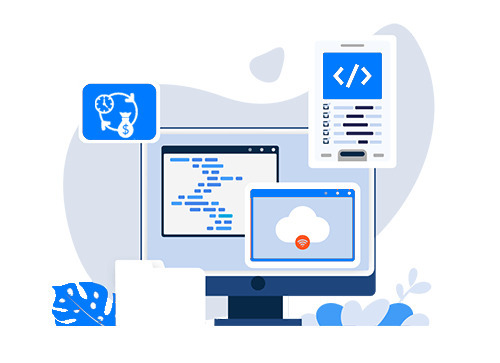
Make your business data-driven and autonomous. Create a competitive edge in the e-commerce market. Web scraping helps to monitor products on millions of sites in real-time and simultaneously. Find e-commerce products, explore social selling sites, automate research, and track competitors. Scraping Intelligence can assist in both data-driven and autonomous business….
Visit Us: E-Commerce & Retail Data Scraping Services| Scraping Intelligence
| Phone: +1 281 899 0267
| Email: [email protected]
#E-commerce Data Scraping#E-commerce Data Scraper#Scrape E-commerce Data#Retail Data Scraping Services#Amazon Data Scraping Services#Amazon Data Scraper
0 notes
Text
Amazon Product Review Data Scraping | Scrape Amazon Product Review Data

In the vast ocean of e-commerce, Amazon stands as an undisputed titan, housing millions of products and catering to the needs of countless consumers worldwide. Amidst this plethora of offerings, product reviews serve as guiding stars, illuminating the path for prospective buyers. Harnessing the insights embedded within these reviews can provide businesses with a competitive edge, offering invaluable market intelligence and consumer sentiment analysis.
In the realm of data acquisition, web scraping emerges as a potent tool, empowering businesses to extract structured data from the labyrinthine expanse of the internet. When it comes to Amazon product review data scraping, this technique becomes particularly indispensable, enabling businesses to glean actionable insights from the vast repository of customer feedback.
Understanding Amazon Product Review Data Scraping
Amazon product review data scraping involves the automated extraction of reviews, ratings, and associated metadata from Amazon product pages. This process typically entails utilizing web scraping tools or custom scripts to navigate through product listings, access review sections, and extract relevant information systematically.
The Components of Amazon Product Review Data:
Review Text: The core content of the review, containing valuable insights, opinions, and feedback from customers regarding their experience with the product.
Rating: The numerical or star-based rating provided by the reviewer, offering a quick glimpse into the overall satisfaction level associated with the product.
Reviewer Information: Details such as the reviewer's username, profile information, and sometimes demographic data, which can be leveraged for segmentation and profiling purposes.
Review Date: The timestamp indicating when the review was posted, aiding in trend analysis and temporal assessment of product performance.
The Benefits of Amazon Product Review Data Scraping
1. Market Research and Competitive Analysis:
By systematically scraping Amazon product reviews, businesses can gain profound insights into market trends, consumer preferences, and competitor performance. Analyzing the sentiment expressed in reviews can unveil strengths, weaknesses, opportunities, and threats within the market landscape, guiding strategic decision-making processes.
2. Product Enhancement and Innovation:
Customer feedback serves as a treasure trove of suggestions and improvement opportunities. By aggregating and analyzing product reviews at scale, businesses can identify recurring themes, pain points, and feature requests, thus informing product enhancement strategies and fostering innovation.
3. Reputation Management:
Proactively monitoring and addressing customer feedback on Amazon can be instrumental in maintaining a positive brand image. Through sentiment analysis and sentiment-based alerts derived from scraped reviews, businesses can swiftly identify and mitigate potential reputation risks, thereby safeguarding brand equity.
4. Pricing and Promotion Strategies:
Analyzing Amazon product reviews can provide valuable insights into perceived product value, price sensitivity, and the effectiveness of promotional campaigns. By correlating review sentiments with pricing fluctuations and promotional activities, businesses can refine their pricing strategies and promotional tactics for optimal market positioning.
Ethical Considerations and Best Practices
While Amazon product review data scraping offers immense potential, it's crucial to approach it ethically and responsibly. Adhering to Amazon's terms of service and respecting user privacy are paramount. Businesses should also exercise caution to ensure compliance with relevant data protection regulations, such as the GDPR.
Moreover, the use of scraped data should be guided by principles of transparency and accountability. Clearly communicating data collection practices and obtaining consent whenever necessary fosters trust and credibility.
Conclusion
Amazon product review data scraping unlocks a wealth of opportunities for businesses seeking to gain a competitive edge in the dynamic e-commerce landscape. By harnessing the power of automated data extraction and analysis, businesses can unearth actionable insights, drive informed decision-making, and cultivate stronger relationships with their customers. However, it's imperative to approach data scraping with integrity, prioritizing ethical considerations and compliance with regulatory frameworks. Embraced judiciously, Amazon product review data scraping can be a catalyst for innovation, growth, and sustainable business success in the digital age.
2 notes
·
View notes
Text
Data Entry
Title: I will do virtual assistant data entry, web scraping, and copy paste.
Description: I am a professional,virtual assistant who will follow your instructions and provide you with high-quality data entry, excel data entry, data collection, copy-paste work, typing, web research, and data scraping services.
You can hire me for this, so that I can do the right data entry and web scraping for you. If you are looking for someone who can quickly gather web scraping and data from any website for you ,then you are at the right place.
My Service Description: Data collection fron any website
Data Entry
Data Mining
Web Scraper
Web Research
Virtual Assistan
Data collection from Linkedin by sales navigator
Copy Paste
PDF to Excel, Word
JPEG to Excel, Word
Excel Data Entry
CRM Data Entry
E-Commerce Products Listing
What are the benefits of working with me:
I will do your work 100% manually Quality work
Quick and fast delivery services
Also, I am experienced for doing complex tasks easily
Your questions are welcome:
If your are not satisfied with my work, we will be open to review your work and we assure you of a great working relationship,
Thank you
Note:To avoid amy confusion please inbox me,before ordering and feel free to discuss your job description.
FAQ:
What type of project do you hande?
As a virtual assistant specialist, I hande every type of project related to data entry.
Can you scrape data from Amy website?
Yes, I can scrape data and amy type of pantcular customized data from amy website according to your repurement.
Do you have a team of around 10 people to do your huge projects in a shart time.
Amy time are you ready to work with me?
Yes,I am always ready any time to work with you.
When can you deliver?
I will complete your task within your required tiom

2 notes
·
View notes
Text
B2B Portal in India
B2B E- Commerce Platform
The relevance of B2B e-commerce to a company’s marketing and sales strategy is simple. E-commerce websites increase the company’s visibility in the digital world and make it easier for them to reach out to their target audience. Taking into account that the B2B market is a lot bigger than the B2C market, companies have ample potential to achieve success.
It's no longer difficult nowadays, thanks to the accessibility of niche b2b portals that can help business owners get started with an e-commerce website. These portals provide all the support needed for developing, designing and managing an e-commerce website, at a fraction of what it cost traditional entrepreneurs.
The e-commerce websites that are specifically designed for businesses to buy and sell with other businesses, generically known as B2B portals.
There are many benefits that come with using B2B e-commerce, such as reduced overhead costs and a higher customer lifetime value.
B2B e-commerce often has different considerations from B2C sites in terms of design, features, and functionality.
A Complete Guide to B2B E-Commerce Platforms and Strategies Used Today
Introduction to B2B E-Commerce
E-commerce can be defined as buying or selling of wares or services over the internet. Some researchers believe that ecommerce shall replace some of the traditional business models in the future. This is due to the convenience and wide range of products it offers in comparison to physical stores.
B2B ecommerce is a way for companies to buy and sell products or services between themselves without involving third party sellers. Additionally, many b2b businesses are now turning into b2b marketplaces where they focus on developing their own platform instead of selling products from other sellers.
Targeting the Right Audience
A go vertical strategy is a business strategy that focuses on a specific market for a business to grow. By targeting customers in one particular group, the company can hope to grow in that area and keep expanding.
When a company decides to go vertical, they do not want this segmentation to interfere with the purpose of their business. It is important for them to maintain their original idea and goals while adapting them for a specific niche.
A successful go vertical strategy will have all of the pieces necessary for success: it's clear who you're going after, what you're offering them, why they should buy from you, how your product will solve their problem, etc.
How to Make Selling Easier with Automation Tools and Efforts
Automation tools are great for streamlining processes and eliminating unnecessary human efforts. They free up time and also promote efficiency in work. A web automation tool is a software that is used to automate repetitive tasks that can be executed via the web. There are many types of tasks that this tool can help you with, such as filling out forms, collecting data from websites, generating email leads and more. The automation tools used by marketers often include: - Email Autoresponders- Landing pages- Marketing automation software (for example Marketo, Pardot or Nimble)- Web scraping software that can analyse data from websites and extract it in a simple or complex manner (for example Zapier, IFTTT or Google Sheets)
Getting Better Results with Dynamic Retargeting Strategies
Retargeting is an important step in the customer lifecycle for any e-commerce business. It can be used to promote new products, boost sales, and encourage repeat visits.
Retargeting is a type of marketing that reaches out to shoppers with ads based on their browsing history. Shoppers are shown products they've visited before with the goal of generating a sale from the previous visitor.
Some popular retargeting platforms are AdRoll, Facebook, and Google Ads Retargeting (GAR). GAR provides cost-effective ways for e-commerce businesses to target potential customers and increase conversions.
Is Your B2B Marketing Strategy Up To Date?
Having a B2B marketing strategy often means that you have to have an entire team of people (or at least one) in charge of executing it. It also means thinking about who your target audience is, how to find them, and how to convince them to buy from you.
A successful strategy is built from an understanding of the company’s own capabilities and limitations. You need to know what resources you have, as well as what skills your employees possess before putting together a plan.
#b2b ecommerce platform#b2b platform#b2bnews#ecommerce#startup#business#b2b digital marketing agency#businessstrategy#businesstips
2 notes
·
View notes
Text
The Many Applications of Residential Proxy Servers
Residential proxy servers are a powerful tool that can enable a wide variety of use cases across different industries. Unlike datacenter proxies that use IP addresses assigned to servers, residential proxies leverage IP addresses belonging to real internet users and their home devices. This provides several key advantages that make residential proxies invaluable for many applications.
Web Scraping and Data Extraction
One of the primary use cases for residential proxies is web scraping and large-scale data extraction. When scraping websites, using residential IPs can significantly reduce the chances of getting blocked or banned. Websites are much more likely to trust and allow requests coming from residential IP addresses versus those from known data centerIP ranges.
This makes residential proxies essential for price comparison, market research, lead generation, and competitive analysis. A market researcher, for example, can use residential proxies to gather sales intelligence data from various e-commerce sites without revealing their actual location or IP address.
Similarly, an e-commerce business can leverage residential IPs to monitor product listings, prices, and reviews across competitor websites. This provides valuable insights to inform their own pricing and product strategies.
Content Access and Geo-Targeting
Residential proxies also enable users to access online content that is restricted or only available in certain geographic regions. This is particularly useful for streaming services like Netflix, Hulu, or BBC iPlayer, which often impose geo-restrictions on their content libraries.
By connecting through a residential proxy in the target location, users can bypass these restrictions and access the local content catalog. This is valuable not just for individual consumers, but also for businesses that need to test their apps and websites from different locations.
Residential proxies can also help businesses deliver more personalized, location-based experiences to their customers. An e-commerce store, for instance, can use residential IPs to show users products, pricing, and promotions tailored to their apparent geographic region.
Ad Verification and Brand Protection
Residential proxy networks are crucial for verifying the delivery and performance of online advertising campaigns. Ad verification providers can use residential IPs to monitor the visibility, placement, and engagement of ads across various websites, apps, and platforms without being detected or blocked.
This helps identify ad fraud, such as bot traffic or competitor interference and ensures brands get the full value from their advertising spend. Residential proxies are also vital for brand protection use cases, where businesses need to constantly monitor the web for copyright infringement, trademark abuse, and other malicious activities.
Application and Website Testing
Residential proxy servers play a key role in testing the functionality, usability, and performance of apps and websites across different locations, devices, and network conditions. Developers and QA teams can use residential IPs to simulate real-world user experiences from various geographic regions.

Fintech and Financial Services
In the financial sector, residential proxies are used for a range of applications, from fraud detection to market data aggregation. Banks and fintech firms can leverage residential IPs to monitor online transactions, identify suspicious activities, and prevent financial crimes like money laundering.
Residential proxies are also crucial for collecting real-time market data, such as stock prices and currency exchange rates, from various sources without being blocked or rate-limited. This data can then be used to power trading algorithms, investment research, and other financial services.
Residential Proxy Advantages
The key advantages that make residential proxies so valuable across these diverse use cases include:
Increased Trust and Reduced Blocking: Websites and online services are generally more trusting of requests from residential IP addresses, as they are less likely to be associated with bots, scrapers, or other malicious activities. This significantly reduces the chances of getting blocked or banned.
Improved Geo-Targeting: Residential proxies allow users to appear as if they are accessing the internet from different geographic locations, enabling more accurate location-based content, pricing, and experiences.
Enhanced Privacy and Anonymity: By masking the user’s actual IP address and location, residential proxies provide an extra layer of privacy and anonymity, which is crucial for sensitive applications like financial services and brand protection.
Scalability and Reliability: Residential proxy networks, such as those offered by providers like NetNut, can offer unlimited concurrent sessions and high availability, ensuring consistent performance and reliability even under heavy load.
0 notes
Text
How to Streamline the Process of Scraping Shopify Product Data
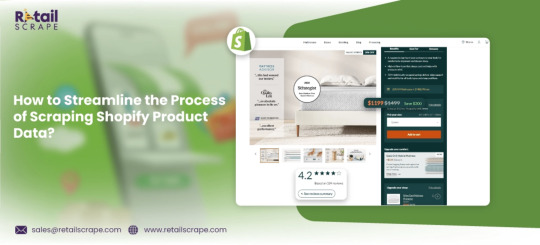
E-commerce data scraping involves the automated collection of information from online shopping platforms. It allows businesses to gather valuable product details, pricing information, customer reviews, and competitor insights. By leveraging e-commerce data scraping services, companies can analyze market trends, monitor competitor pricing strategies, and optimize their own product offerings and pricing.
One notable example is scraping Shopify product data. Shopify is a leading e-commerce platform that hosts millions of online stores worldwide. Scraping Shopify product data enables businesses to extract information about products listed in Shopify stores, including product names, descriptions, prices, and availability. This data can be used for various purposes, such as market research, competitor analysis, and pricing optimization. Additionally, Shopify data scraping services allow businesses to stay informed about trends in their industry and make data-driven decisions to enhance their online presence and competitiveness.
Tips to Keep in Mind While Scraping Shopify Product Data
When scraping Shopify product data, it's essential to follow specific guidelines and best practices to ensure compliance with its terms of service and obtain accurate and valuable data. Here are some tips to keep in mind:
Respect Robots.txt: Check the robots.txt file of the Shopify store to see if web scraping is allowed or restricted. Respect any directives outlined in the robots.txt file to avoid being blocked by the website.
Use API if Available: To access product data, utilize Shopify's API (Application Programming Interface). The API provides a structured and authorized way to retrieve information, ensuring compliance with Shopify's policies.
Set a Crawling Rate: If scraping without an API, set a crawling rate to avoid overloading the server with requests. Excessive scraping can lead to IP blocking or other penalties. A reasonable crawling rate helps maintain a positive relationship with the website.
Monitor Changes: Shopify stores may frequently update product information. Regularly monitor the website for product listings, prices, or availability changes to ensure that scraped data remains accurate and up-to-date.
Respect Terms of Service: Familiarize yourself with Shopify's terms of service and abide by them while scraping product data. Avoid engaging in activities that could violate Shopify's policies or disrupt the website's operation.
Use Scraping Tools Responsibly: If using scraping tools or software, ensure they are used responsibly and ethically. Avoid aggressive scraping tactics that may strain the website's resources or compromise security.
Handle Personal Data Appropriately: If product data includes personal information such as customer reviews, handle it by applicable data protection laws and regulations, such as GDPR or CCPA.
Be Transparent: If the scraped data will be used for commercial purposes or shared with third parties, be transparent about its source and obtain any necessary permissions or consents.
By adhering to these tips, businesses can effectively scrape Shopify product data while complying with Shopify's policies and ethical standards. It allows them to leverage valuable insights for market research, competitor analysis, and business optimization.
How to Leverage the Scraped Shopify Product Data?
Leveraging scraped Shopify product data can provide businesses with valuable insights and opportunities for growth. Here are several ways to effectively utilize this data:
Market Research: Analyze the scraped product data to identify market trends, popular products, and customer preferences. This information can help businesses understand their target audience better and tailor their marketing strategies accordingly.
Competitor Analysis: Compare scraped Shopify product data with competitors' offerings to gain insights into pricing strategies, product assortments, and unique selling points. This analysis can inform competitive pricing, product differentiation, and strategic positioning.
Inventory Management: Use scraped product data to monitor inventory levels, track product availability, and identify bestselling items. This information enables businesses to optimize inventory management processes, prevent stockouts, and minimize overstocking.
Price Optimization: Analyze pricing data scraped from Shopify stores to identify pricing trends, price fluctuations, and competitive pricing strategies. Businesses can adjust their pricing strategies dynamically based on market conditions, competitor pricing, and customer demand to maximize profitability.
Product Development: Use scraped product data to identify gaps in the market, emerging trends, and customer preferences. This information can guide product development efforts, helping businesses create or improve existing products to meet customer needs and preferences.
Content Creation: Utilize product descriptions, customer reviews, and other scraped content to create engaging and informative product descriptions, marketing materials, and website content. Compelling content can enhance the customer shopping experience and drive sales.
Personalization: Leverage scraped product data to personalize the customer shopping experience, recommend relevant products, and target marketing campaigns based on individual preferences and past purchasing behavior.
Sales Forecasting: Use historical sales data scraped from Shopify stores to forecast future sales trends, plan inventory levels, and allocate resources effectively. Accurate sales forecasts help businesses optimize production schedules, manage cash flow, and minimize stockouts.
By effectively leveraging e-commerce data scraper, businesses can gain actionable insights, optimize operations, and drive growth in the competitive e-commerce landscape. However, ensuring compliance with data privacy regulations and ethical standards is essential while using scraped data for business purposes.
Steps to Scrape Shopify Product Data
Extracting Shopify product data involves several steps to ensure accurate and comprehensive scraping. Here's a detailed guide to scraping e-commerce product data:
Install the Web Scraper Tool:
Begin by downloading and installing a web scraper tool that suits your needs. Ensure that the tool supports the extraction of data from Shopify websites.
Create a New Project:
Open the web scraper tool and create a new project. Provide a name for your project and enter the URL of the Shopify website from which you want to extract product data. Allow the page to render within the web scraper tool.
Select Product Names:
Click on the name of a product in the first set of results on the page. The selected name will be highlighted in green to indicate it has been chosen. The remaining product names will turn yellow. Click on the name of the second product in the list to select it. All selected product names will now be highlighted in green.
Rename the Selection:
On the left-hand sidebar of the web scraper tool, rename the selection to "product." It indicates that you are scraping product names and URLs for each product.
Use Relative Select:
Click on the plus (+) sign next to the product selection on the sidebar and choose the "Relative Select" command. With this command, click on the name of the first product on the page and then on the product's price. Repeat this step to train the web scraper tool to extract the desired data accurately.
Repeat for Additional Data:
Repeat the previous step to scrape additional data, such as product styles and images. Rename the new selections accordingly to keep track of the data being extracted.
Run and Export the Project:
Once all necessary data selections have been made, it's time to run the scraping job. Click the "Get Data" button on the left-hand sidebar and then "Run" to start the scraping process. Consider running a test for longer projects to verify that the data will be formatted correctly.
Download the Scraped Data:
After completing the scraping job, you can download the extracted data as a convenient spreadsheet or JSON file. This data will include product names, URLs, prices, styles, images, or any other information you can scrape from the Shopify website.
Following these detailed steps, you can effectively scrape Shopify product data using a web scraper tool. Remember to ensure compliance with Shopify's terms of service and use the scraped data responsibly.
Conclusion
Extracting Shopify product data is a systematic process that involves careful selection and training of a web scraper tool. Following the outlined steps, businesses can efficiently gather valuable information such as product names, URLs, prices, styles, and images from Shopify websites. This data can be leveraged for market research, competitor analysis, inventory management, pricing optimization, and other strategic decision-making processes. However, it's crucial to adhere to ethical guidelines and respect Shopify's terms of service to ensure responsible data scraping practices. With proper execution, extracting Shopify product data can give businesses actionable insights to drive growth and success.
Transform your retail operations with Retail Scrape Company's data-driven solutions. Harness real-time data scraping to understand consumer behavior, fine-tune pricing strategies, and outpace competitors. Our services offer comprehensive pricing optimization and strategic decision support. Elevate your business today and unlock maximum profitability. Reach out to us now to revolutionize your retail operations!
know more :
https://www.retailscrape.com/streamline-the-process-of-scraping-shopify-product-data.php
#ScrapingShopifyProductData#ScrapeShopifyProductData#ShopifyProductDataCollection#ShopifyProductDataScraper#ExtractShopifyProductData
0 notes
Text
How to Effortlessly Scrape Product Listings from Rakuten?
Use simple steps to scrape product listings from Rakuten efficiently. Enhance your e-commerce business by accessing valuable data with web scraping techniques.
Know More :
https://www.iwebdatascraping.com/effortlessly-scrape-product-listings-from-rakuten.php
#scraping Rakuten's product listings#Data Scraped from Rakuten#Scrape Product Listings From Rakuten#Rakuten data scraping services#Web Scraping Rakuten Website#Web scraping e-commerce sites
0 notes
Text
Unveiling Growth Opportunities: E-Commerce Product Data Scraping Services

In the rapidly evolving realm of e-commerce, success hinges on the ability to make informed decisions. The secret sauce? Data. By leveraging the power of eCommerce Product Data Scraping Services, businesses can gain a competitive edge by tapping into the vast universe of information that online platforms hold. Let’s dive into how this revolutionary service can transform your e-commerce game
The Data-Driven Advantage
E-commerce is no longer about intuition; it’s about insights. With E-Commerce Product Data Scraping Services, you can collect a wealth of information from various e-commerce websites — from product details and pricing to customer reviews and inventory levels. This data is the cornerstone of strategic decision-making, enabling you to align your offerings with market demand and outpace competitors.
Unearth Trends and Stay Relevant
Imagine being ahead of the curve by predicting trends before they hit the mainstream. Data scraping empowers you to identify emerging trends and shifting consumer preferences, allowing you to adjust your product lineup and marketing strategies proactively. Whether it’s the latest fashion craze or a niche gadget, having real-time insights positions you as a market leader.
Outsmart Competitors
Competition in e-commerce is fierce. But armed with data, you’re not just competing; you’re strategizing. Analyzing competitor pricing, product assortments, and customer sentiment gives you a clear picture of your competitive landscape. This knowledge allows you to fine-tune your pricing strategy, differentiate your offerings, and provide a superior customer experience.
Personalization and Customer Engagement
Understanding your customers is pivotal. Data scraping reveals what your customers are looking for, what influences their purchase decisions, and how they engage with your products. Armed with this knowledge, you can tailor your offerings to individual preferences, enhance customer engagement, and foster long-lasting relationships.
Ethical Data Harvesting
Responsible data scraping is paramount. Reputable E-Commerce Product Data Scraping Services adhere to ethical practices, respecting the terms of service of websites while extracting valuable information. This ensures that you not only obtain accurate and reliable data but also maintain a positive online reputation.
Tailored Solutions for Maximum Impact
Every e-commerce business is unique. That’s why E-Commerce Product Data Scraping Services offer customizable solutions tailored to your specific needs. Whether you’re a startup seeking market insights or an established retailer looking to fine-tune your strategies, these services can be adapted to drive your business forward.
Conclusion
In the dynamic landscape of e-commerce, data is your guiding light. E-Commerce Product Data Scraping Services empower you to turn raw information into actionable insights, propelling your business toward growth and success. Don’t rely on guesswork when the power of data is at your fingertips. Embrace data scraping and watch your e-commerce venture thrive in the digital age.
Know more >
#Scrape eCommerce Product Data#eCommerce Product Data Scraper#E-Commerce Product Data Scraping Services#E-Commerce Product Extractor
0 notes
Text
Real-Time Web Scraping API Services in the USA
Access clean and structured data from your database in real time with our web scraping API services. Available for USA, UK, Australia, Germany, Canada, and UAE.
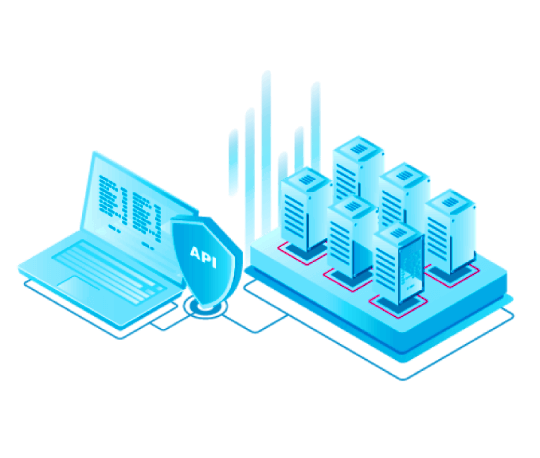
#Real-Time Web Scraping API Services#Web Scraping API Services#Scrape Product Information from E-commerce website#Scrape Realtime Website Data
0 notes
Link
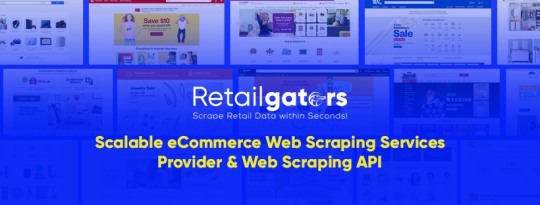
RetailGators offers eCommerce scraping tools, which help you to provide eCommerce web scraping services at best prices in the USA, UK, Australia, UAE, Germany.
#eCommerce Data Scraping#e commerce scraping services#web scraping services#ecommercescraping#ecommerce web scraping
1 note
·
View note
Link
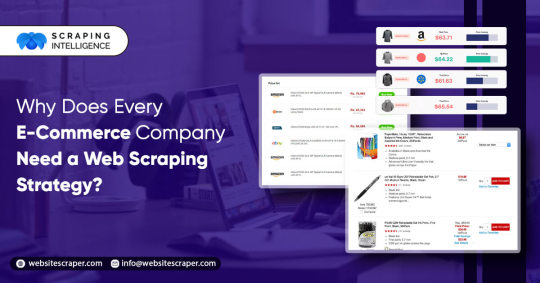
Refer to this blog and learn various reasons of how web scraping e-commerce data will be used by companies to make new web scraping strategies
Know more : https://www.websitescraper.com/why-does-every-e-commerce-company-need-a-web-scraping-strategy.php
#Web Scraping Strategy#E-Commerce Data Scraping#E-Commerce Web Scraping#Web scraping service#scrape data from online retailers#Web scraping e-commerce data
0 notes
Text
Why It's Extremely Important to Extract E-Commerce Websites in the Modern Era?
0 notes